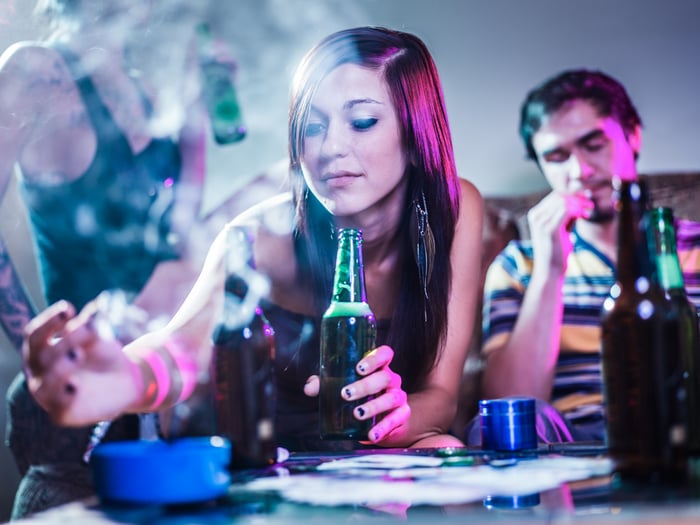Because legal marijuana is reportedly cutting into beer sales, brewers have openly embraced cannabis companies. Constellation Brands (STZ -0.18%) was the first major alcoholic beverage company to break the taboo of investing in a pot stock, buying a $4 billion stake in Canadian producer Canopy Growth (CGC -3.13%) in 2017. And it wasn't long before FOMO, or the fear of missing out, gripped other brewers, too.
Anheuser-Busch InBev (BUD 0.39%) partnered with Tilray (TLRY -6.01%) in 2018, Molson Coors (TAP 0.44%) did so with HEXO (HEXO) that same year, and Boston Beer just last month announced it was establishing a cannabis research-and-development hub in Canada.
They've all bought into the idea that cannabis-infused beverages are needed to staunch hemorrhaging beer sales to the tune of millions, if not billions, of dollars. Maybe they should first have asked consumers if that's what they wanted.

Image source: Getty Images.
I'll drink to that
Beverages infused with cannabidiol (CBD, the non-psychoactive one of the two most common chemical compounds found in marijuana) sound like they should be a hit. Easily ingestible, cannabis drinks provide a convenient way for consumers to enjoy both a nonalcoholic beverage and a bit of CBD.
Constellation and Canopy Growth launched their Quatreau brand of CBD-infused sparkling water in Canada last year and made it available in the U.S. earlier this year. Using its patented Distilled Cannabis process, the lineup contains 20 milligrams of U.S.-grown, hemp-based CBD per serving and comes in four flavors.
Anheuser-Busch and Tilray, meanwhile, formed Fluent Beverages, and in late 2019 launched their first CBD drink, Everie. It uses what it calls CBD isolate, a purified form of CBD that offers 98% pure CBD with less than 0.05mg of THC (tetrahydrocannabinol, the psychoactive compound in marijuana responsible for the "high") per serving.
Similarly, Molson and HEXO formed a joint venture called Truss Beverage and are mounting a big marketing campaign in Canada to inform consumers they can buy CBD-infused beverages at the same place they purchase their marijuana. And in 2018, Heineken's (HEINY 0.47%) Lagunitas launched a THC-infused sparkling water in the U.S. that was inspired by India pale ales, or IPAs.
Unfortunately for the beer and pot companies, the "rocket fuel" they expected has failed to deliver, and the CBD drink rocket is still on the launchpad.

Image source: Getty Images.
Snacks over drinks
Bloomberg reports CBD drinks are proving to be a tough sell. Hifyre, a Canadian cannabis data analytics firm, found that CBD beverages in Canada generated only $28 million in sales in 2020, or slightly more than 1% of the total $2.6 billion in legal marijuana revenue.
While these drinks are selling a bit more in Canada this year (they're up to $24 million almost halfway through the year), they're nonetheless falling woefully short of the $529 million analysts were forecasting just a couple of years ago.
The companies have faced a few hurdles, such as CBD drinks not being allowed to be sold at restaurants and bars in Canada (in the U.S., it's hit or miss), but only at licensed stores, which makes it more difficult to reach consumers.
Still, the Agri-food Analytics Lab of Dalhousie University in Nova Scotia surveyed 1,000 Canadians and found they weren't all that excited about CBD drinks anyway. Only 4% preferred drinking their CBD compared to ingesting it by other means, such as with edibles, suggesting CBD drinks might be a segment that never really takes off.
It's not much better in the U.S., where Seattle-based cannabis analytics firm Headset found sales of adult-use and medical edibles were taking off -- up 60% in 2020 from the prior year. Meanwhile, in one market (Michigan), beverages barely even register on the radar with a 0.2% market share (edibles had over 16%).
An expensive experiment
Constellation continues to take losses on its investment in Canopy Growth as the pot company has laid off workers, shut down two greenhouses, and announced an $800 million writedown. Tobacco giant Altria (MO 0.86%), which invested $1.8 billion in Cronos Group (CRON -0.82%), also is losing money on its investment and says it is monitoring the situation.
The beverage giants put a lot of money into marijuana, but the bet is not paying off, and CBD drinks could cause further expensive writedowns in the future.
Big Beer's decision to invest in marijuana stocks broke down barriers and opened the floodgates for other types of big consumer product companies like Kraft Heinz and Nestle to begin experimenting with edibles and other combinations. The latter companies might end up being the big winners if the consumer preference surveys hold out.
CBD drinks themselves, however, might just go flat, rather than offsetting the decline in beer consumption as the brewers had hoped.





